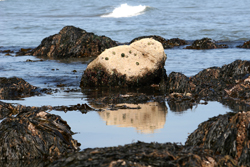Effect of global warming on genetic diversity
Extreme environments such as the Baltic Sea are expected to strongly favour those organisms best adapted to the region's enormous ranges of temperature and salinity. A recent review highlighted that many species living in the Baltic Sea demonstrated lower intraspecific diversity than in the North Sea or Atlantic. Therefore, the question arises whether genetic diversity decreases due to environmental stress or if marginal populations have the lowest levels genetic diversity. With funding from the EU, the IDA project is investigating the selective forces behind the loss of genetic diversity in bladderwrack (Fucus vesiculosus) a common seaweed and key species in the Baltic. Project partners are also conducting laboratory-based experiments on F. vesiculosus to determine the fitness of different genomes. Temperature and salinity influence successful germination in F. vesiculosus, with sensitivity to temperature varying among genotypes. Scientists searched for genetic polymorphism, the existence of two or more different forms within the same species, in F. vesiculosus by examining its response to herbivore activity. The researchers investigated the genetic basis of anti-herbivore defence, when the seaweed produces metabolites in response to attack by sea snails. The results will help prove that an ecofunctional genomics approach can be used to achieve new insights into the defence mechanisms of seaweed. Data collected by the IDA consortium will, therefore, help determine just one of the many expected effects of global warming on species - genetic diversity.



